Lyubov Orlova
Lyubov Petrovna Orlova (Russian: Любо́вь Петро́вна Орло́ва; 29 January [O.S. 11 February] 1902, Zvenigorod – 26 January 1975, Moscow) was the first recognized star of Soviet cinema, a famous theatre actress, and a gifted singer.
Lyubov Orlova | |
|---|---|
Любо́вь Орло́ва | |
Lyubov Orlova playing a famous female scientist in Springtime, 1947 | |
| Born | Lyubov Petrovna Orlova 29 January 1902 |
| Died | 26 January 1975 (aged 72) Moscow, USSR |
| Resting place | Novodevichy Cemetery, Moscow 55°43′29″N 37°33′15″E |
| Nationality | Russian |
| Alma mater | Moscow Conservatory Institute of Music and Drama |
| Occupation | Actor, pianist, singer, dancer |
| Years active | 1933–1974 |
| Spouse(s) | Andrei Berzin (1926–1930; divorced) Grigori Aleksandrov (1933–1975; her death) |
Life and career
She was born to a family of Russian hereditary nobles in Zvenigorod, 60 km from Moscow, then lived with her parents and older sister in Yaroslavl.[1] There she began to study music. In 1914, after her father left for the front, her mother Evgenia Nikolaevna and her daughters settled in Moscow, where the sisters entered the gymnasium. The Orlovs spent the difficult years of the Civil War in Voskresensk because their mother's sister lived here. The family subsisted on funds from the sale of milk which was given by the aunt's cow. Lyuba and Nonna drove nearly a hundred kilometers to Moscow, and then went home, with heavy cans. Hence comes the legend of the ugly hands which Orlova was so shy about.[2]−[3] Her first and last names are meaningful words in Russian: любовь means "love", and Орлова is the feminine form of орлов "eagle".
When she was seven, Fyodor Shalyapin predicted her future as a famous actress. She studied as a pianist at the Moscow Conservatory (Professor K. Kipp class) but did not graduate because she had to work to support her parents.[4] Her first husband, a Soviet economist, Andrei Berzin, was arrested in 1930. However, this did not affect her career. Dmitri Shcheglov, a biography author, wrote in Love and Mask ('Lyubov i maska', 1997): "As the eternal irony and foresight of fate, the best performer of the roles of house servants and enthusiasts of Communist labor was a descendant of ten Russian Orthodox saints. Two of them, Olga, the Grand Princess of Kiev, and Vladimir, the Grand Prince of Kiev, are among the Equal-to-apostles... Red Eagle in an azure-golden field, the House of Orlov's coat of arms, is also present on the Bezhetsk clan branch the actress belonged to..."[5]
In 1933 she met the novice director Grigory Alexandrov, who was casting actors for his movie Jolly Fellows (1934), and married him. Orlova's performance in this comedy, very popular in the USSR, earned the young star the sympathy of Stalin and the title "Honorable actor of the RSFSR". It had caused the first wave of the so-called "Orlova syndrome", a Soviet psychiatric term describing women who wanted to be like Orlova. They diligently lightened their hair and self-styled themselves as relatives to the idol.[6]
In the next few years she starred in four popular movies which also became instant Soviet classics: Circus (1936), Volga-Volga (1938), Tanya (1940), and Springtime (1947). She was awarded the Stalin Prize in 1941. In 1950, she became the first woman to receive the title of the People's Artist of the USSR exclusively for her cinematic works. After that, she switched to playing in theatre productions of Yuri Zavadsky's company. Since the 1928 till her death, she was constantly touring as a singer with her pianist Leo Mironov (Russian: Лев Миронов, romanized: Lev Mironov). Her early repertoire included classical songs by Glinka, Mussorgsky, Dargomyzhsky and Tchaikovsky.[7] During the war, she toured more than 50,000 kilometers along the front line, with her concerts based on Isaak Dunayevsky songs from her movies.[8]
Legacy
A minor planet, 3108 Lyubov, discovered by Soviet astronomer Lyudmila Zhuravlyova in 1972, is named after her.[9] A cruise ship named after her was built by the Soviet Union in Yugoslavia in 1976 for expeditions to Antarctica and the Arctic Circle.[10][11]
In 2016, a monument of Orlova in Zvenigorod was established near the Lyubov Orlova Cultural Centre (est. 2007).[12]
In 2019, she was featured as a Google Doodle on what would have been her 117th birthday.[13]
Selected filmography
- 1934 — A Petersburg Night
- 1934 — Jolly Fellows
- 1936 — Circus
- 1938 — Volga-Volga
- 1940 — Tanya
- 1941 — Fighting Film Collection #4
- 1943 — A Family
- 1947 — Springtime (Special award for female role, Venice Film Festival)
- 1950 — Meeting on the Elbe
- 1950 — Mussorgsky
- 1952 — Man of Music
- 1960 — Russian Souvenir
Gallery
- Photos
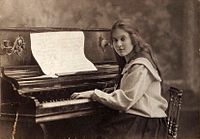 Lyubov Orlova in 1916
Lyubov Orlova in 1916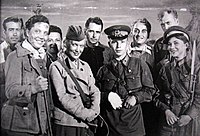 During the shooting of Fighting Film Collection #4 in 1941
During the shooting of Fighting Film Collection #4 in 1941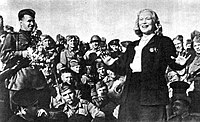 Singing for the Soviet soldiers during WWII
Singing for the Soviet soldiers during WWII Lyubov Orlova sees off Soviet troops departing to the front
Lyubov Orlova sees off Soviet troops departing to the front
- Influential roles
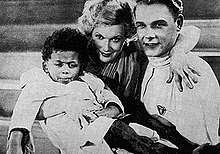 According to the official art history version, the unfading contoversial[15] film Circus[16] had inspired Vera Mukhina to create the sculpture Worker and Kolkhoz Woman (1937), especially the male part played by Orlova's partner Sergei Stolyarov, 10 years junior than Orlova.[17]
According to the official art history version, the unfading contoversial[15] film Circus[16] had inspired Vera Mukhina to create the sculpture Worker and Kolkhoz Woman (1937), especially the male part played by Orlova's partner Sergei Stolyarov, 10 years junior than Orlova.[17].png) Lyubov Orlova character screams "Follow Me" (За мной!) in Volga-Volga (1938). Despite rumors, it has absolutely no connection to The Motherland Calls monument, as according to the official Soviet art history version.[18]
Lyubov Orlova character screams "Follow Me" (За мной!) in Volga-Volga (1938). Despite rumors, it has absolutely no connection to The Motherland Calls monument, as according to the official Soviet art history version.[18]- Orlova's two title roles in Springtime (1947). In 1990s, it was revisited by the German critic Uve Schpilman as "a forerunner of postmodernism". Other critics argue the movie is an undoubted harbinger of F. Fellini's 8 1/2, films by Antonioni and Wenders.[19]
- Commemorative items
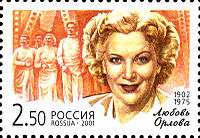 Postage Stamp, Russia, 2001
Postage Stamp, Russia, 2001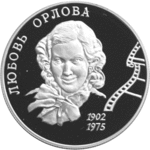 2002, Bank of Russia, Series: "Outstanding Personalities of Russia", 100th birth anniversary
2002, Bank of Russia, Series: "Outstanding Personalities of Russia", 100th birth anniversary
References
- "Артистка Любовь Орлова имела знаменитых владимирских предков" [An artist Lyubov Orlova had had famous Vladimir ancestors]. prizyv.ru (in Russian). 7 December 2018. Retrieved 10 August 2020.
- Golikova, N.. (2014). Lyubov Orlova (in Russian). Molodaya Gvardiya. ISBN 978-5-235-03745-8.
- "Vnukovo Archive reveals the secrets of Lyubov Orlova: Unknown photos of the sex symbol of the Soviet era". kp.ru (in Russian). Komsomolskaya Pravda in Ukraine. 15 January 2017. Retrieved 15 August 2020.
- "Любовь Орлова — студентка Московской консерватории" [Lyubov Orlova as Moscow Conservatory student]. mosconsv.ru (in Russian). Moscow Conservatory. Retrieved 10 August 2020.
- Scsheglov, Dmitri (1997). Lyubov i maska (in Russian). Moscow: Olymp. ISBN 9785885908115.
- "Lyubov Orlova did not like to be photographed". ng.ru (in Russian). Nezamisimaya Gazeta. Retrieved 15 August 2020.
- Orlova, Lyubov (2017). "Fragments from actress' memories". chapaev.media (in Russian). Retrieved 16 August 2020.
- Kushnirov, Mark. "Before Cinematograph". chapaev.media (in Russian). Retrieved 15 August 2020.
- Orlova, Lyubov (1961). "Dunayevsky in My Life". chapaev.media (in Russian). Soviet Composer. Retrieved 16 August 2020.
- "3108 Lyubov 1972 – Google Search". Retrieved 4 May 2018 – via Google Books.
- Hubbard, Amy, "Ghost ship Lyubov Orlova and starving rats headed for land?", Los Angeles Times, 23 January 2014. Retrieved 8 February 2014.
- Layne, Ken, "Abandoned Cruise Ship Full of Starving Rats Headed For Land" Archived 8 February 2014 at the Wayback Machine, Gawker, 1/23/14. Retrieved via facebook 8 February 2014.
- "Памятник Любови Орловой открыли в субботу в городском округе Звенигород" [Lyubov Orlova Monument in the urban district of Zvenigorod was opened on Saturday] (in Russian). RIA Novosti - Moscow Oblast. Retrieved 13 August 2020.
- "Культурный центр Любови Орловой в Звенигороде" [Lyubov Orlova Zvenigorod Cultural Centere]. mosoblkino.ru (in Russian). Retrieved 13 August 2020.
- "Lyubov Orlova's 117th Birthday". Doodles Archive, Google. 11 February 2019.
- "Volga-Volga (1998)" (in Russian). Mosfilm. Retrieved 11 August 2020.
- "Орлова и Александров: тайная жизнь советских небожителей. От 25.05.16". YouTube (in Russian). Pryamoy Efir.
- ""The Blue Angel" and Blackface: Redeeming Entertainment in Aleksandrov's "Circus"". jstor.org. Retrieved 15 August 2020.
- "Несказочная судьба самого известного богатыря советского кино: Что стало причиной раннего ухода Сергея Столярова" [Non-fairytale fate of the most famous hero of Soviet cinema: What had caused an early death of Sergei Stolyarov]. kulturologia.ru (in Russian). Retrieved 15 August 2020.
- ""The Motherland Calls!" 10 facts about the monument". culture.ru. Retrieved 14 August 2020.
- "Alexandrov Grigory Vasil'evich Biography". k1ni.ru (in Russian). Retrieved 15 August 2020.
External links
- Lyubov Orlova on IMDb
- (in Russian) lubov-orlova.ru
- (in Russian) Site-Museum of Lyubov Orlova
- (in Russian) Records of Lyubov Orlova on website The Encyclopedia of Russian recordings Russian-Records.com
- (in Russian) "Ее советское сиятельство", ("Her Soviet Serenity") an article in Kommersant-Money